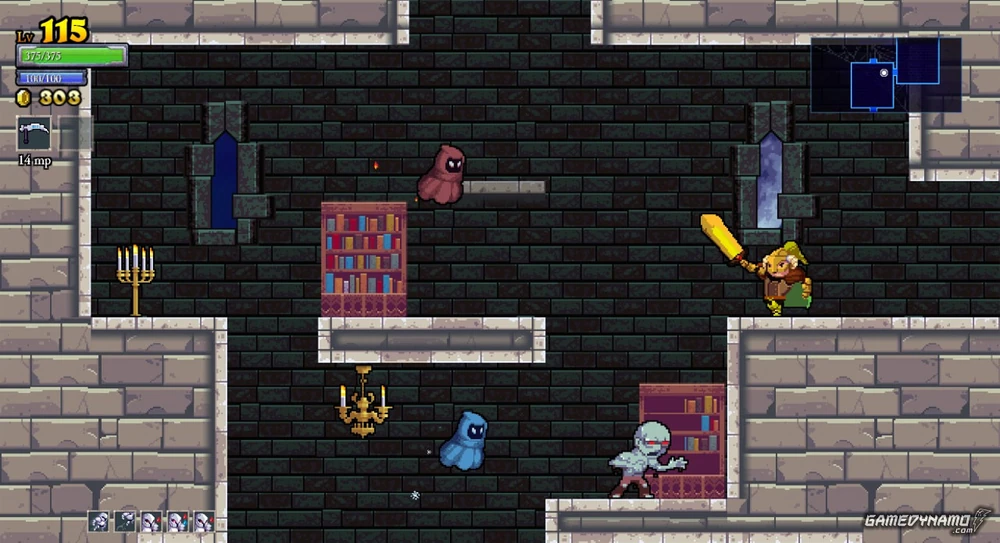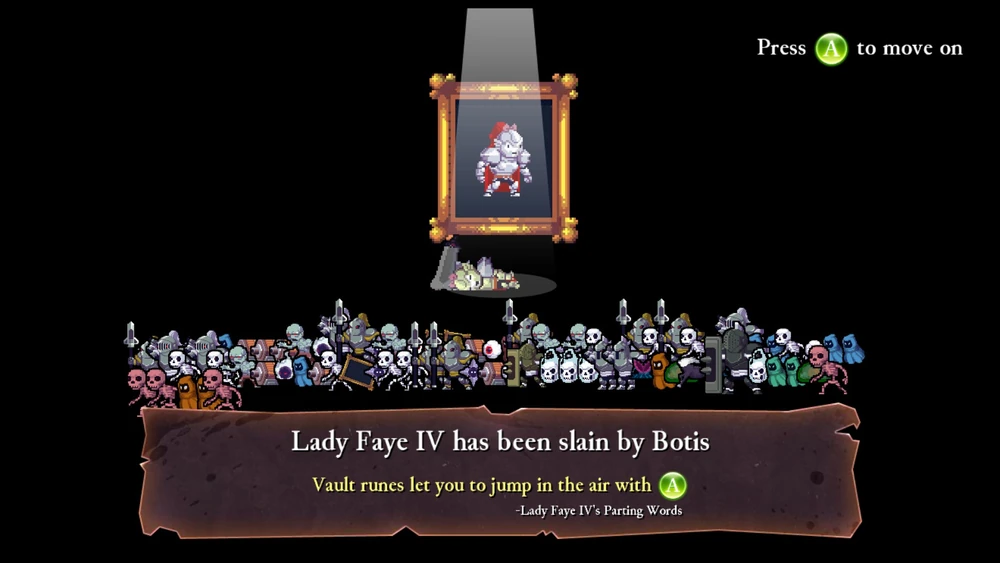Rogue Legacy is a hilarious and addictive action platformer from Cellar Door Games. Despite being released over a year ago I decided to review it now because a) this website didn’t exist back then and b) it was recently added to the free games list for PlayStation Plus subscribers. That seemed as good a reason as any to replay this gem of a platformer and provide a review for those yet to experience it.
With traits similar to micro-transaction phone games it would be easy to categorise Rogue Legacy as a “pay to win” platformer which feeds off your desire to upgrade and succeed. Levels are procedurally generated and you can expect to die quickly and often. With each death you are given an opportunity to spend any accumulated gold on upgrades or equipment to, hopefully, make your next attempt a little easier. In this way Rogue Legacy plays off a desire to try “just one more round”, often transforming a 5 minute game into an hour long adventure.

This could easily become boring if it weren’t for the wealth of customisation and variation. When you perish you’re given the option to continue as one of three heirs, each with their own particular class and traits. Sometimes these traits are useful like preventing you from triggering spike traps or granting you extra knockback. Other times they’re detrimental and invert the screen or hide your health bar. No matter what the effect is it’s always cleverly implemented and displayed with an amusing description and results. Classes are a little more useful and help dictate how you approach your enemies. For example; Hokages deal massive damage but can’t score critical hits, Lichs steal life adding to their own max HP but start with a smaller bar, and Archmages get bonus mana and magic damage at the cost of strength and HP. They’re just a few examples; with more than 36 traits and 9 classes the available variations ensure a constantly changing experience.
At it’s core the game is a pretty stock standard platformer. Character control is precise and easy to use although the lack of momentum when jumping may take Mario fans a bit to get used to. There are four areas to the game, each containing a series of procedurally generated rooms, and all accessible from the start. While the variable rooms seem daunting at first it’s not long before you start recognising patterns and realise there is a finite number of combinations. Rooms are fairly simple in design with a combination of fireball traps, spike traps and enemies to contend with. Each is choc full of breakable items offering everything from chicken drumsticks to gold coins or even mana potions. Occasionally you’ll be lucky enough to find a treasure chest whose contents range in value proportionate to the method to open them. Some, like Fairy chests hold valuable magic runes and require completion of room based objectives to open while others, like regular chests usually only require that you reach them.

A common theme with Rogue Legacy is a simplistic facade masking complicated, back end statistics – and combat is no different. Hero’s are equipped with a sword for melee and magic for ranged attacks. Melee is very powerful but carries the risk of needing to be close to an enemy while magic varies in power or effectiveness and offers little choice in variation once an heir is selected. The power of your chosen method is dictated by your character stats; strength or chance of critical is good for melee and intelligence or mana are essential for magic. Some classes are better suited to certain attacks as each has base stat modifiers that will affect your gameplay. Assassin’s, for example, get a big boost to the chance and effect of their critical attacks but suffer a big hit to their other base stats.
Enemies are well designed to accommodate any play style you choose with movement patterns and attacks suited to either magic or melee. Some enemies or bosses are more easily defeated with a particular class or fighting style but, for the most part, it’s well balanced and fair. Enemies scale according to the area you’re in which helps determine the order in which you should proceed. As mentioned earlier you can expect to die often in Rogue Legacy. .. actually to say you’re expected to die frequently would be an error. Gameplay isn’t always frenetic so, in many cases, a calm and measured approach will enhance your chance of survival. That said speed and versatility are what you should be aiming for and will better prepare you for each area’s boss fight.
Each time perish you’re given the option to spend any gold your ancestor accumulated. Gold can be used to upgrade your base statistics, unlock new classes, and purchasing armour or runes. Upon re-entering Castle Hamson you must pay a hefty toll which discourages a frugal approach to shopping. This “die, upgrade, retry” theme makes it easy to forget that there’s a core story to the game and, each time you die, you’re actually killing off an heir in a family line. When I first started playing my goal was to make each hero live as long as possible; by the end I was throwing away heirs like yesterday’s jam, trying new builds, practicing a boss fights or just doing a “money run” to purchase some new stuff!

This changing mentality introduced an interesting subtext that reminded me of something I experienced playing Hotline Miami. As you progress you gradually become desensitised to the impact of what you’re doing. In Hotline Miami’s casethis was the impact and brutality of your killing whereas, in Rogue Legacy, it’s the generations of heirs dying in pursuit of their parents’ goals. While not directly referenced until the end it’s a constant theme and subtly implied as you unveil the game’s story. Rogue Legacy doesn’t have a particularly deep or engaging story but the way it’s told is fantastic. The scene is set by the tutorial level and then learnt by reading journal entries of a mysterious prince as you progress through the game. For a “fast and furious” platformer this is the perfect way to uncover a story and adds impact to the final scene. What makes it even more interesting is the concept’s contrast to the comic demeanour of the rest of the game.
A big difference between the PC and PlayStation version was the addition of cross play functionality. I’m normally a fan of this, however, in this case it wasn’t well implemented and proved more detrimental than beneficial. The main reason for this was that, when synching, it displayed a spinning cog at the top right of your screen. This is the location of the mini map which meant that the cog partially obscured your map (more so on the Vita than PS4). The constant synchronisation also meant that bringing your Vita out of standby meant interupted gameplay as the console tried to reconnect and synch your data on the fly. I presume this is to ensure people don’t abuse the feature and cheat but it would have been less of a detriment had they restricted it to activating when changing a room instead of being active all the time. Despite this I still wanted to try the feature out but, unfortunately, I was unable to get it to work. While troubleshooting I read many complaints from users losing hours worth of save due to obscure prompts whilst synching so I decided not to risk trying any further.

These are minor issues in the scheme of things. Rogue Legacy is an enjoyable, if repetitive, game that looks great and sounds fantastic. The retro styling works well without going so far as to be a Shovel Knight type tribute. The music is catchy and perfectly suited, quirky in parts and ramped up for boss fights. Sound effects are used to good effect and even had me laughing out loud at times. There’s something irrefutably humorous about hearing an heir with irritable bowel syndrome farting every so often when jumping. Farts aside all the “ting” of coin drops, grunts, melee and magic sounds are perfectly implemented to provide important feedback and give the game that polished feel.
In summary Rogue Legacy is an exceptional platformer that should appeal to anyone who likes the genre. With a heavy reliance on stats it rewards those who grind but doesn’t do so at the expense of requiring skill to win. It’s perfectly balanced and had the right mix of risk versus reward to keep me hooked until the end. The pervasive humor is evident in every aspect of the game; from the wording of the diary entries to the trait descriptions, from the way the characters appear to the text on the loading screen. It’s a cleverly designed game that everyone should try, especially if you have PlayStation Plus as, if you grab it in February 2015, it’s free!